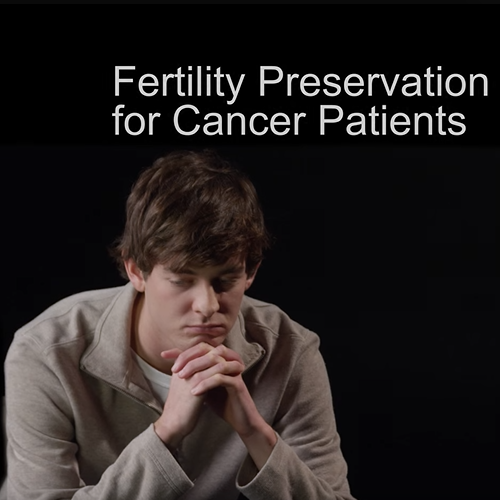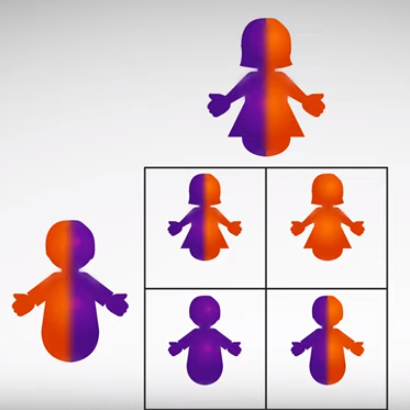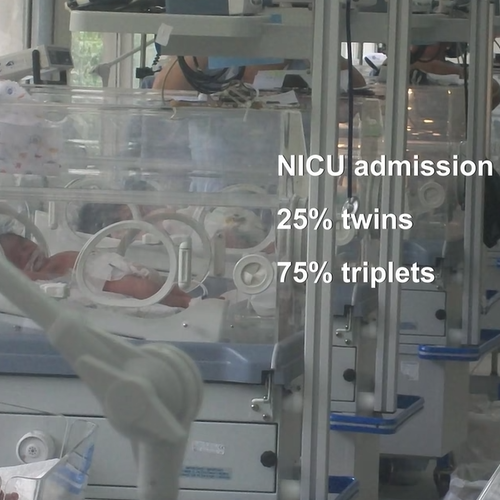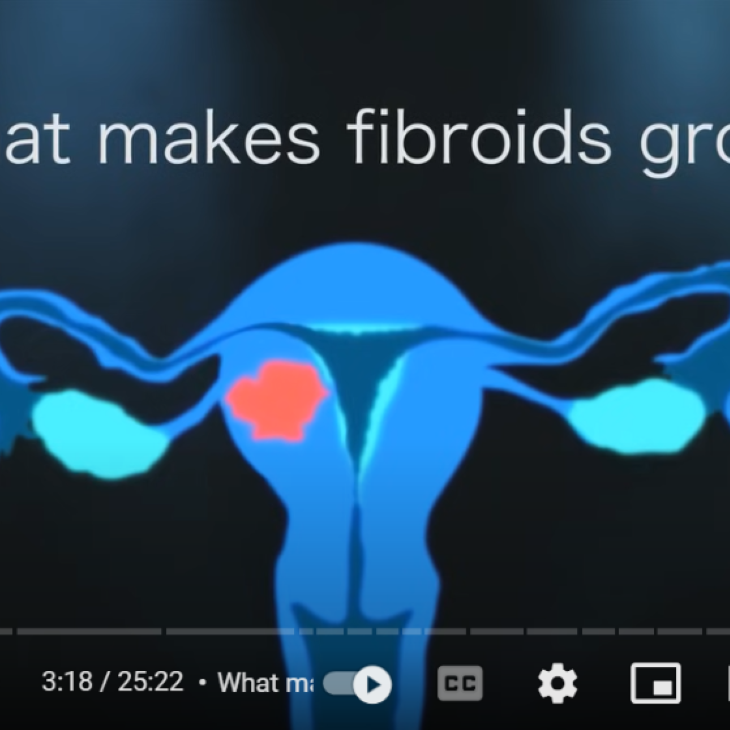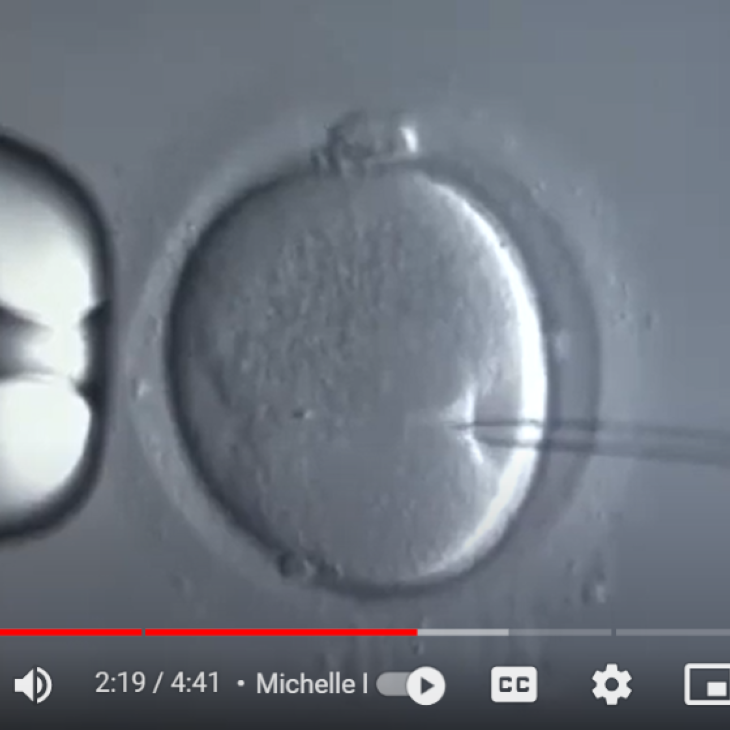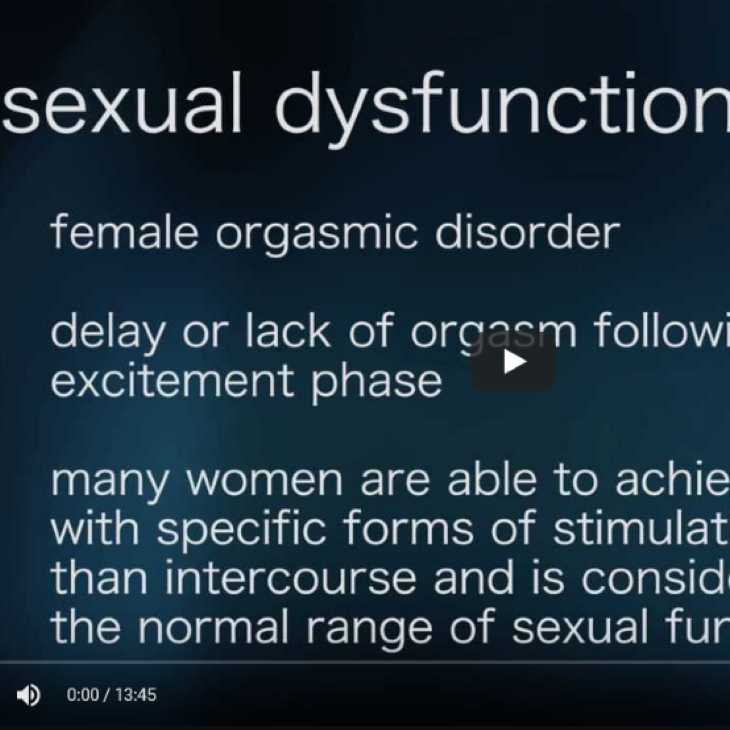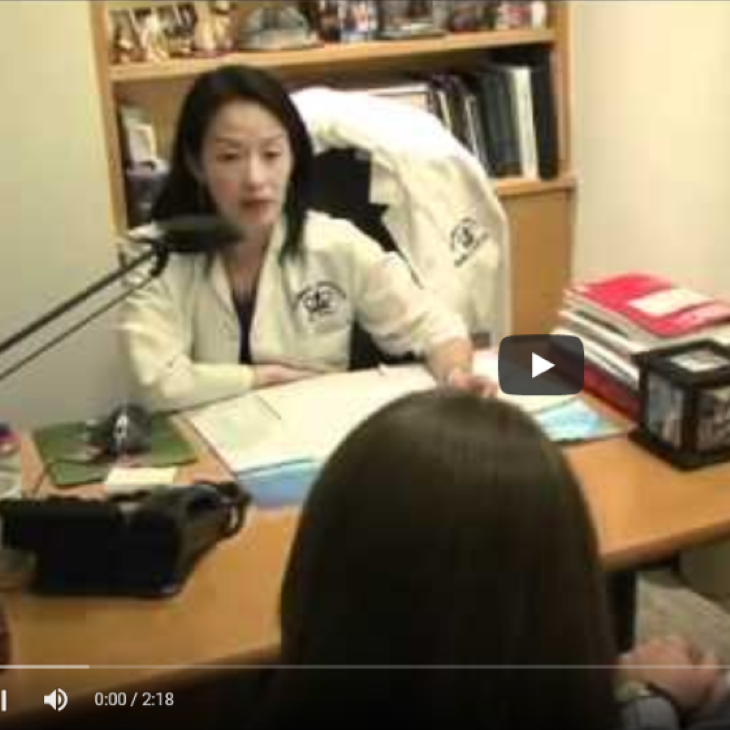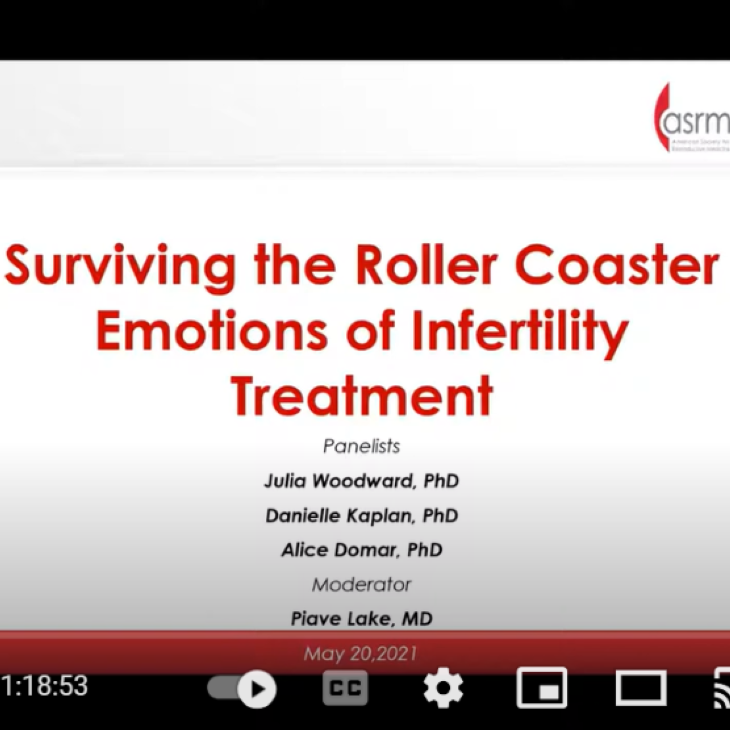Fertility Preservation for Cancer Patients
Transcript
When a person is facing a cancer diagnosis and treatment, having children later in life may seem like a low priority. However, an important part of cancer treatment is to carefully evaluate each person's medical situation, goals for parenthood, and cancer treatment plan.
NARRATOR: Joe and Carol have each been diagnosed with cancer and will need to discuss chemotherapy with their oncologist.
DOCTOR: Now that we have a plan of action to treat your cancer, there are a few more things to discuss.
PATIENT: OK- I’m anxious to get started.
DOCTOR: I’d like to talk to you about your plans for having children.
PATIENT: I really haven’t thought about children.
DOCTOR: I understand. It’s worth a visit to a fertility specialist to understand your options.
Patients with a recent diagnosis of cancer are often caught up in the medical situation at hand and are not thinking about having children later. However, many treatments for cancer can affect a person’s ability to have children long after the treatment for cancer is ended. This is especially true for cancers that are near or involve the reproductive organs or those that include chemotherapy known to damage sperm production or eggs.
Fertility Considerations
- If you are facing treatments that might impact your ability to have children later, it is important to consider taking measures to preserve your future fertility. A specialist in reproductive medicine is a good starting point.
- Adolescents may have NO IDEA if they want children in the future.
- Partnership status can influence how a person feels about having children.
- Fertility preservation should be offered to all patients regardless of whether they have partners or other children.
- Relationship status can change. Sometimes cancer makes people want children more or less than before.
Fertility Preservation in Women
NARRATOR: Carol and her oncologist are discussing the tumors on her colon and her treatment plan.
DOCTOR: Because the tumors are on your bowel near your ovaries, the radiation treatment after the surgery can permanently harm your ovaries and prevent you from being able to have a baby. Were you aware of that?
PATIENT: No, I didn’t realize that. I definitely want the option to have children later. Is there anything I can do?
DOCTOR: Let’s make an appointment with a specialist that focuses on protecting your fertility and go from there. We’ll work together to plan the right course for you for now and for later.
Reproductive endocrinologists are doctors that specialize in the treatment of women’s infertility,
For women facing treatments that may harm reproductive function, these doctors can help them preserve their fertility through a variety of techniques- some well-established and some newer and experimental.
DOCTOR: Good morning, so what brings you here today?
PATIENT: I am going to begin cancer treatment, and my doctor warned me that it could make me unable to have kids. I’ve been worried that after I recover I might never be able to have a child. She suggested that I come talk to you.
DOCTOR: It’s true that cancer treatment can affect your fertility later. The good news is that, depending on the treatment and your cancer, there are ways to protect your ability to have a child in the future.
PATIENT: That makes me feel a little better. What are my options?
A recent diagnosis of cancer, particularly in a young patient, is obviously very stressful. Most patients have multiple concerns. Among these concerns are the effects of cancer and its treatment on reproduction and fertility. Most young people who are diagnosed with cancer will conquer their disease and be cured. So, it is very reasonable for you to consider options to protect your ability to have children later.
Unless cancer is directly invading the reproductive organs, it is unlikely that the cancer itself will affect fertility. However, the treatments for cancer - surgery, radiation therapy, and chemotherapy - can have a significant impact on fertility.
This video will discuss the effect of these treatments on infertility in general. A fertility preservation specialist will be able to discuss the specific impact of an individual treatment plan on fertility.
Surgery involving reproductive organs including the uterus, fallopian tubes, or ovaries, can decrease fertility. Depending on the location of the cancer, surgeons may need to remove some or all reproductive organs, even if the cancer does not directly involve these organs.
For example, in the treatment of colon cancer, the surgeon may need to remove the uterus or one or both ovaries. It is important to talk with your cancer doctors about your desire to have children in the future and the possibility of a conservative surgical approach or protection of the reproductive organs during radiation.
Sometimes, when a surgeon operates near the reproductive organs, even if these organs are not directly involved, scar tissue may form that can impact fertility.
Some, but not all, chemotherapy can damage the eggs in the ovaries. Because of this, some women may go into menopause after receiving treatment with chemotherapy. Others continue to get monthly or irregular menstrual bleeding but may still have difficulty getting pregnant. And still others resume or continue normal periods and have no problems having children later.
If you are getting chemotherapy as part of your cancer treatment, you need to discuss the possibility that chemotherapy might cause you to go into menopause. A doctor specializing in reproduction can discuss with you ways to preserve your fertility.
Radiation therapy can be very effective to kill cancer cells but, unfortunately, can permanently damage the ovaries and the uterus.
PATIENT: But my radiation is on my colon- how does that damage my ovaries?
DOCTOR: Your ovaries are located near the colon.
If you are having radiation therapy in that area, your fertility specialist or cancer surgeon may be able to move your ovaries away from the radiation field and protect the ovaries’ ability to produce hormones and mature eggs. This surgery, which is called a transposition of the ovary or oophoropexy, is done after the radiation oncologist "maps out" your radiation field.
Unfortunately, the uterus cannot be moved away from the radiation field, and radiation therapy will sometimes damage it. If your uterus is damaged and you are unable to carry a pregnancy, embryos made from your eggs can be transferred to a gestational carrier. This is another woman who will carry and deliver your baby.
PATIENT: I’m really worried that chemotherapy will keep me from being able to get pregnant later.
During chemotherapy many women will stop having their periods. The probability that you will begin having normal periods again after chemotherapy is related to:
- Your age
- The type of chemotherapy that you receive
- The amount of chemotherapy that you receive
The main technique for fertility preservation involves freezing either eggs or embryos (fertilized eggs). Both of these techniques can be very successful. How successful depends on your age, your medical and gynecologic history, your diagnosis, and on your genetics. Thousands of babies have been born after egg freezing and more than 500,000 after of embryo freezing.
DOCTOR: Since your treatment can wait a few weeks, one option to consider is freezing your eggs or fertilizing them with sperm, growing them into embryos and then freezing the embryos.
PATIENT: Why would that take a few weeks? What is involved in freezing my eggs? How do I know whether I should freeze eggs or embryos?
Freezing either eggs or embryos requires that you undergo a period of ovarian stimulation. This means that you will be taking medications to stimulate your ovaries to develop multiple eggs at once. This is similar to what would be done if you were having in vitro fertilization, sometimes called IVF, to try to get pregnant. In women with hormone-affected cancers, ovarian stimulation may accelerate the growth of cancer. The potential benefit of being able to have a child, or a better chance of having a child, must be weighed against the risk.
Most of the medications used to stimulate your ovaries are injectable, although some oral medications may also be used. These medications must be taken exactly as they are prescribed. Your doctor will be closely monitoring you with blood work and ultrasounds to check how your ovaries are responding.
When your ovaries are ready, eggs are removed by placing an ultrasound probe into your vagina while guiding a needle into your ovaries. This procedure is done while you are comfortably sedated with anesthesia. The eggs are removed by gentle aspiration. The entire procedure usually takes about 10 to 30 minutes. An embryologist puts the eggs into a special solution in the laboratory.
The eggs can then be frozen. Until recently, egg freezing was considered experimental, but we now have a better understanding about how to freeze eggs. Egg freezing has become a routine, non-experimental procedure for women undergoing therapies that could be harmful to the ovaries. Once prepared, the frozen eggs are placed in liquid nitrogen and can be stored indefinitely.
Another option is to have your eggs fertilized with your partner’s sperm or sperm from a donor. This creates embryos that can be frozen. Embryo freezing has been performed for a longer period of time than egg freezing and may have a higher success rate, depending on the clinic’s expertise.
Again, talk to your fertility preservation team about whether to freeze eggs or embryos and determine which option is best for you.
When freezing eggs or embryos, it is important to consider the yearly cost of storage.
Also, it is important to talk with your family and fertility doctor about what to do with any frozen eggs or embryos in the event you do not want or are not able to use them. It is also important to consider what should be done with the eggs/embryos in the case of death, such as donation, research or discard. Posthumous reproduction is a possibility in some states. This would allow a family member to use the eggs or embryos to have children later.
PATIENT: After the eggs or embryos are frozen, how are they used later?
When you are ready to get pregnant, the eggs or embryos are removed from the freezer and thawed. Most eggs and embryos will survive the freezing and thawing process, but some may not. The embryologist will check them after the thawing process to determine if they survived. Eggs are fertilized to become embryos. Your fertility doctor may need to prepare your or your gestational carrier’s uterus for the thawed eggs/embryos by prescribing estrogen, usually in a pill or skin patch form, and progesterone usually vaginal suppositories or injections.
Sometimes the woman’s natural ovulation cycle is used to time transfer of embryos to the uterus. In either case, the person who will carry the embryo will require monitoring involving blood tests and ultrasound exams every few days for a couple of weeks.
When ready, the embryos are transferred to your uterus or to the uterus of a gestational carrier.
PATIENT: What if I decide I don’t want to delay my treatment or go through the egg retrieval? Are there any other options that won’t delay my cancer surgery or involve all the medicines for stimulation of my ovaries?
There are several experimental treatments for fertility preservation. These options may be best if you don’t wish to, or are unable to undergo, an ovary stimulation cycle. Some of these options include In vitro maturation. ovarian tissue cryopreservation, and chemical protection for the ovary. We will discuss each one.
In vitro maturation, or IVM, is a process where immature eggs are removed from your ovary and matured in the laboratory. The eggs are removed from the ovary in a process similar to the egg retrieval in IVF. Unlike with IVF, for IVM, a woman does not have to take medication to stimulate her ovaries or may be given only a few days of medications. This may be necessary if you do not have the time to undergo full ovarian stimulation or have a condition that would make higher-dose stimulation unsafe.
However, there is not much information from cancer patients about the quality of the eggs that have been matured in the laboratory or on how well these eggs can be frozen and thawed. Therefore, this procedure is only done in a research setting.
Another experimental option is ovarian tissue cryopreservation. Ovarian tissue cryopreservation is a process where all or part of an ovary is removed and frozen. The majority of eggs in the ovary sit in the outer part of the ovary called the cortex. Once the ovary is removed, small strips from the cortex can be frozen. This procedure requires general anesthesia and surgery to remove the ovarian tissue from the body.
When you are ready to get pregnant, these strips can be transplanted back to your body to produce eggs. Depending on where the ovary strips are placed, you may be able to get pregnant without further assistance from a fertility specialist. However, it is most likely that you will require IVF in order to become pregnant. It is important to understand that this fertility preservation option requires a second, and maybe more, surgeries to place the removed ovarian tissue back into the body.
To date, there have been about 30 deliveries reported in cancer survivors who have had ovarian tissue cryopreserved.
Scientists are also working on ways to extract eggs from removed ovarian tissue without having to transplant the tissue.
There are also medications that are being developed to protect the ovary from the damage caused by radiation and chemotherapy. None of the medications are approved for this purpose and it is not clear if they are actually effective.
If you choose not to preserve eggs, embryos or ovarian tissue, your fertility preservation doctor may discuss these options with you.
Fertility preservation in men
Cancer treatment can include surgery, radiation, and chemotherapy. Treatment that involves reproductive organs such as the testes, prostate, penis, and the reproductive tract can impact fertility.
Depending on where the tumors are, cancer surgeons may need to remove reproductive organs or other organs that are important for fertility and/or sexual function. For example, in the treatment of prostate cancer, the surgeon will remove the prostate and seminal vesicles. These men still sense orgasm, but will no longer ejaculate which is the release of semen from their penis, or produce semen, the fluid released from the penis during ejaculation that contains sperm.
It is important to discuss your desire to have children in the future and the possibility of conservative surgical approaches with your cancer surgeon.
DOCTOR: Now that we have a plan of action to treat your cancer, there are a few more things that we need to discuss.
PATIENT: I’m anxious to get started.
DOCTOR: I’d like to talk to you about your plans to have children.
PATIENT: Well, I haven’t thought about children.
DOCTOR: I understand. It’s worth a visit to a fertility specialist so that you can understand your options.
Fertility preservation in men is different (and simpler!) in many ways than in women.
Collection:
For women, egg retrieval is an involved process that can include ovarian stimulation and requires a medical procedure to collect the eggs. However, in men, sperm collection is a noninvasive procedure that can be accomplished without medical help.
Time:
Egg cryopreservation requires a woman to be at a particular point in her menstrual cycle and/or undergo ovarian stimulation, which takes time. Men can give a sample any time or place.
Numbers:
A woman matures 1 egg per menstrual cycle unless her ovaries are stimulated with special medicines. Men produce millions of sperm each time they ejaculate.
Safety:
In women with hormone-affected cancers, taking medications for ovarian stimulation can be risky. Men do not need to take medicine that can affect their cancer in order to preserve their fertility.
Cell biology:
In eggs, the DNA is unfolded and easily injured, while in sperm, the DNA is tightly bunched and less susceptible to damage from freezing or harmful therapies like chemotherapy and radiation.
In men and teens who have undergone puberty and who have no reproductive issues, semen collection and freezing is a relatively simple, inexpensive, and noninvasive procedure.
In these cases, men are given a collection device and shown to a private room where they masturbate until they ejaculate. Some men are unable or unwilling to masturbate. In those cases, a special condom can be used to collect sperm during intercourse.
The semen containing sperm is mixed with protective liquids to prevent damage during the freezing and thawing process, frozen, and stored for use later.
It is important to remember that some men, particularly adolescents, can feel uncomfortable discussing sperm or masturbation with health professionals or around family members. They may feel uneasy with the idea of producing a sample on demand in a medical setting. Men who can’t ejaculate and boys who haven’t entered puberty still have options.
Men may not be able to ejaculate for many reasons, such as damage to the nerves that control ejaculation, a spinal cord injury, or emotional reasons. Strategies like bladder collection, vibratory stimulation, and electroejaculation can help to collect mature sperm.
For other men, particularly those with small amounts or no mature sperm in their ejaculate, sperm can sometimes be retrieved surgically (TESE, MESA, PESA). Sperm collected using these methods are not able to fertilize an egg on their own. They will need to be injected directly into an egg during a process called intracytoplasmic sperm injection, or ICSI. ICSI requires the female partner to undergo IVF when it’s time to conceive.
For boys who have not reached puberty, fertility preservation techniques are still experimental. If a boy has not yet begun to make mature sperm, called spermatogenesis, the choices are limited.
In some research centers across the world, samples from the testes are removed and frozen. When it’s time to attempt pregnancy, the tissue is examined for stem cells. The hope is to isolate these few cells and mature them into functional sperm. So far, animal research is promising and human studies are ongoing.
PATIENT: So, I’d like to save some sperm for later, just in case. But I’ve always thought about having more than one child. What happens now?
DOCTOR: Because sperm production and quality are affected by many things, we recommend collecting 2 or 3 samples. Each sample we collect can be divided into multiple vials that can be used for several attempts to conceive, so you should be able to have as many children as you want.
PATIENT: I may not be ready to have a kid for a while. How long can sperm stay frozen?
DOCTOR: Sperm can be stored indefinitely. Some sperm has been used as many as 20 years later with no problems. When was the last time you ejaculated?
PATIENT: Why is that important?
DOCTOR: The best sperm sample is collected after about 3 days of abstinence. We’ll need to work with my nurse to schedule a few times for you to come in and give a sample.
PATIENT: That’s embarrassing.
DOCTOR: You’ll have privacy and you are welcome to bring magazines or movies with you if you would like to.
PATIENT: That sounds OK. Thanks for helping, Doctor. This is a big load off my mind.
When a person is facing a cancer diagnosis and treatment, having children later in life may seem like a low priority. However, an important part of cancer treatment is to carefully evaluate each person’s medical situation, goals for parenthood, and cancer treatment plan. This can help decide the right path for each individual before cancer treatment begins and options are limited.
Communication and coordination between the cancer treatment team, patient, and fertility preservation team is key.
Fertility Preservation
Cancer
Find a Health Professional


